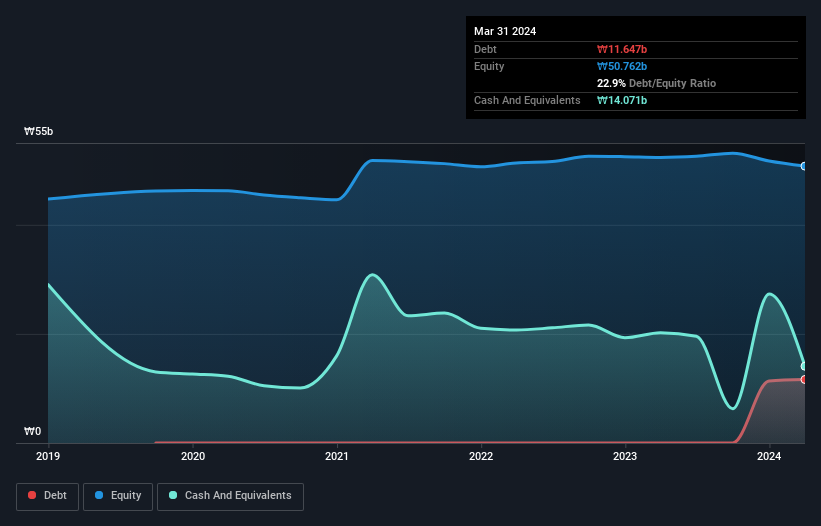
Legendary fund manager Li Lu (who Charlie Munger backed) once said, 'The biggest investment risk is not the volatility of prices, but whether you will suffer a permanent loss of capital.' It's only natural to consider a company's balance sheet when you examine how risky it is, since debt is often involved when a business collapses. As with many other companies BIFIDO Co., Ltd. (KOSDAQ:238200) makes use of debt. But should shareholders be worried about its use of debt?
What Risk Does Debt Bring?
Generally speaking, debt only becomes a real problem when a company can't easily pay it off, either by raising capital or with its own cash flow. In the worst case scenario, a company can go bankrupt if it cannot pay its creditors. However, a more frequent (but still costly) occurrence is where a company must issue shares at bargain-basement prices, permanently diluting shareholders, just to shore up its balance sheet. Of course, debt can be an important tool in businesses, particularly capital heavy businesses. The first thing to do when considering how much debt a business uses is to look at its cash and debt together.
View our latest analysis for BIFIDO
What Is BIFIDO's Net Debt?
As you can see below, at the end of March 2024, BIFIDO had ₩11.6b of debt, up from none a year ago. Click the image for more detail. But on the other hand it also has ₩14.1b in cash, leading to a ₩2.42b net cash position.

How Strong Is BIFIDO's Balance Sheet?
The latest balance sheet data shows that BIFIDO had liabilities of ₩19.8b due within a year, and liabilities of ₩336.0m falling due after that. Offsetting this, it had ₩14.1b in cash and ₩18.0b in receivables that were due within 12 months. So it actually has ₩12.0b more liquid assets than total liabilities.
This surplus strongly suggests that BIFIDO has a rock-solid balance sheet (and the debt is of no concern whatsoever). With this in mind one could posit that its balance sheet means the company is able to handle some adversity. Succinctly put, BIFIDO boasts net cash, so it's fair to say it does not have a heavy debt load! When analysing debt levels, the balance sheet is the obvious place to start. But you can't view debt in total isolation; since BIFIDO will need earnings to service that debt. So if you're keen to discover more about its earnings, it might be worth checking out this graph of its long term earnings trend.
In the last year BIFIDO wasn't profitable at an EBIT level, but managed to grow its revenue by 29%, to ₩18b. Shareholders probably have their fingers crossed that it can grow its way to profits.
So How Risky Is BIFIDO?
While BIFIDO lost money on an earnings before interest and tax (EBIT) level, it actually booked a paper profit of ₩242m. So taking that on face value, and considering the cash, we don't think its very risky in the near term. We think its revenue growth of 29% is a good sign. There's no doubt fast top line growth can cure all manner of ills, for a stock. When analysing debt levels, the balance sheet is the obvious place to start. However, not all investment risk resides within the balance sheet - far from it. These risks can be hard to spot. Every company has them, and we've spotted 4 warning signs for BIFIDO (of which 1 is a bit concerning!) you should know about.
If you're interested in investing in businesses that can grow profits without the burden of debt, then check out this free list of growing businesses that have net cash on the balance sheet.
If you're looking to trade BIFIDO, open an account with the lowest-cost platform trusted by professionals, Interactive Brokers.
With clients in over 200 countries and territories, and access to 160 markets, IBKR lets you trade stocks, options, futures, forex, bonds and funds from a single integrated account.
Enjoy no hidden fees, no account minimums, and FX conversion rates as low as 0.03%, far better than what most brokers offer.
Sponsored ContentValuation is complex, but we're here to simplify it.
Discover if BIFIDO might be undervalued or overvalued with our detailed analysis, featuring fair value estimates, potential risks, dividends, insider trades, and its financial condition.
Access Free AnalysisHave feedback on this article? Concerned about the content? Get in touch with us directly. Alternatively, email editorial-team (at) simplywallst.com.
This article by Simply Wall St is general in nature. We provide commentary based on historical data and analyst forecasts only using an unbiased methodology and our articles are not intended to be financial advice. It does not constitute a recommendation to buy or sell any stock, and does not take account of your objectives, or your financial situation. We aim to bring you long-term focused analysis driven by fundamental data. Note that our analysis may not factor in the latest price-sensitive company announcements or qualitative material. Simply Wall St has no position in any stocks mentioned.
Have feedback on this article? Concerned about the content? Get in touch with us directly. Alternatively, email editorial-team@simplywallst.com
About KOSDAQ:A238200
BIFIDO
Produces probiotics-based products in South Korea and internationally.
Mediocre balance sheet very low.
Market Insights
Community Narratives



